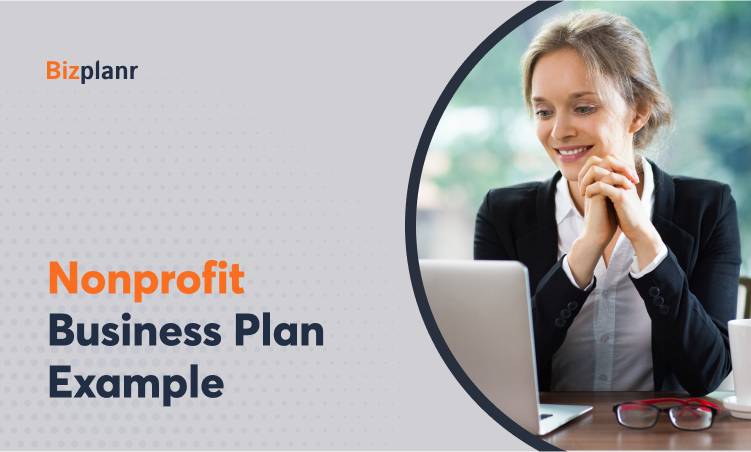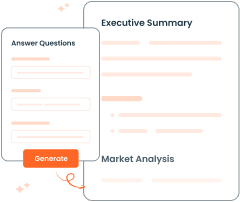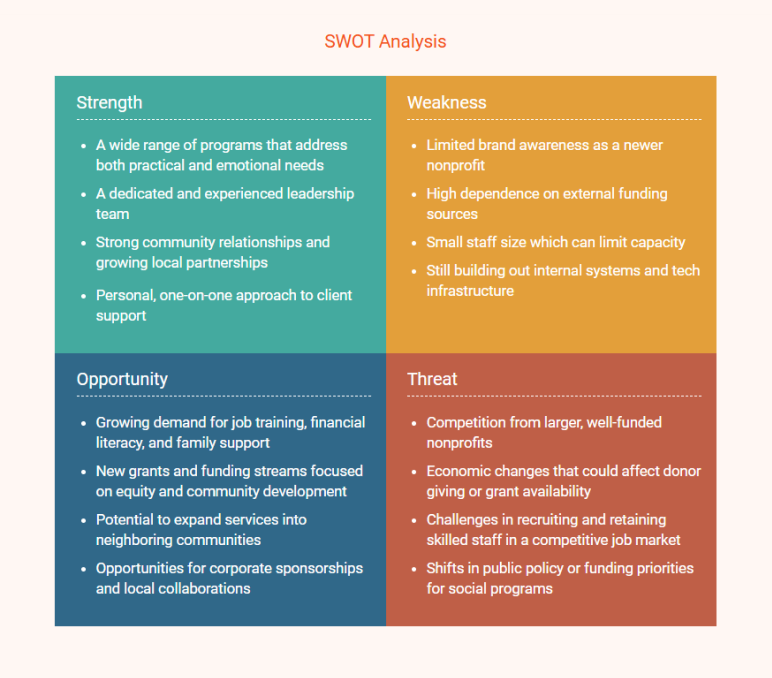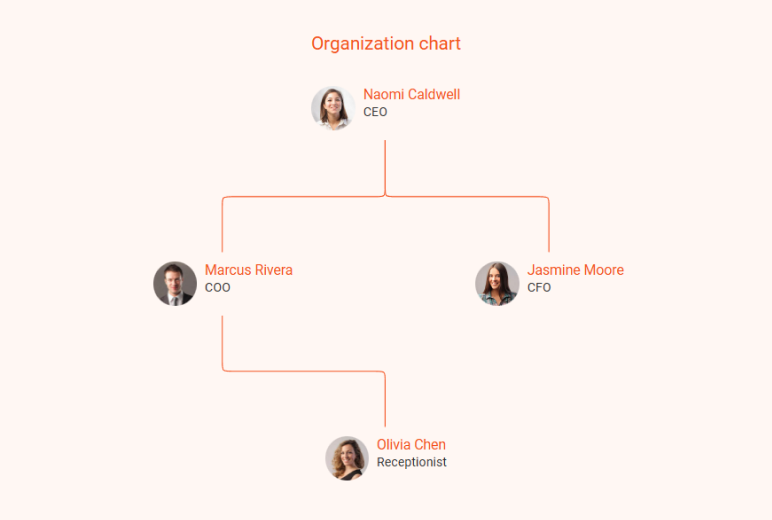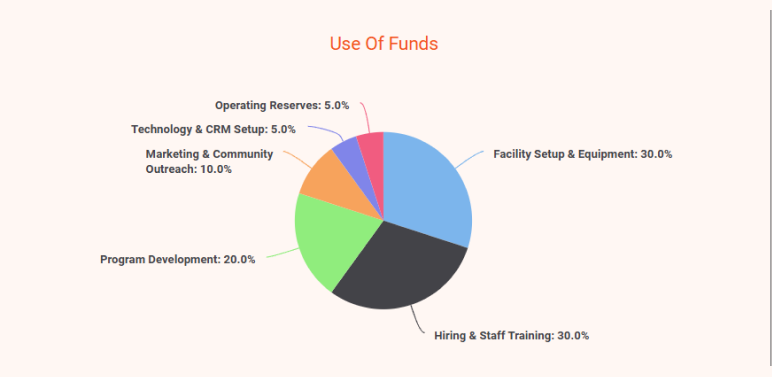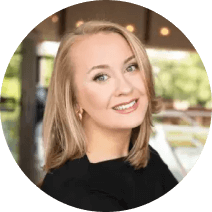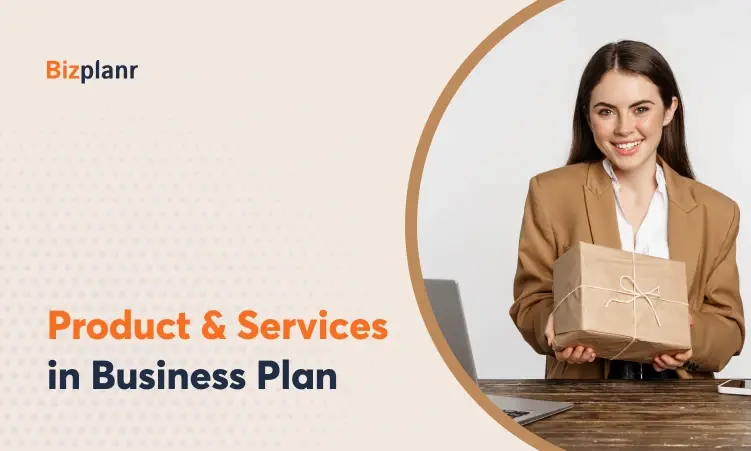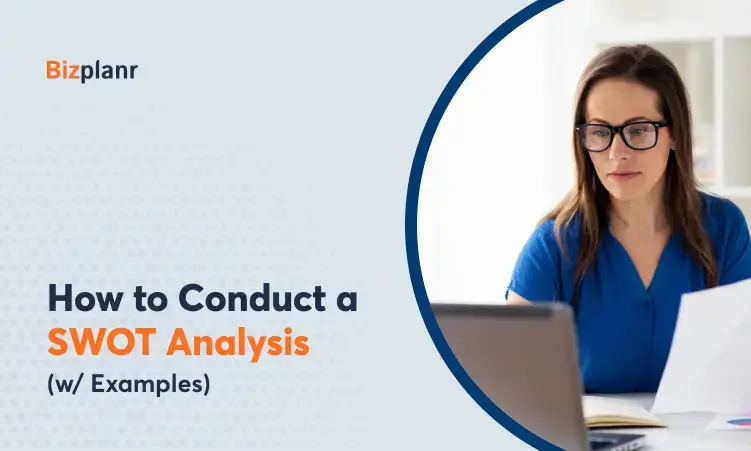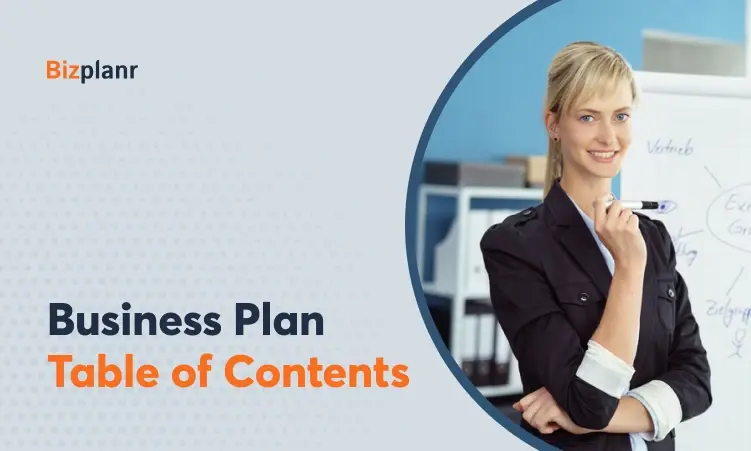You’ve got a cause you believe in—and now you’re ready to build something real around it. Well, that’s a big move. But before you jump in, there’s a lot more to figure out.
Where will the money come from? Who’s helping you run things? What does your day-to-day look like? And how will you keep it all going?
That’s where a clear business plan matters. It helps you sort through the messy stuff, stay focused, and shows people (and funders) that you’re serious and know where you’re headed.
Wondering how to draft your plan?
This non-profit business plan sample is here to help you get started.
Nonprofit Business Plan Sample
Explore the sample business plan of The Rising Horizon Foundation and find helpful ideas for shaping each section of your own nonprofit plan with purpose and direction.
1. Executive Summary
Business Overview
The Rising Horizon Foundation is a non-profit organization located in Seattle, Washington. We support individuals and families who are facing difficult times, especially when it comes to searching, managing money, or accessing education.
Our programs are created to provide practical help to people that leads to long-term freedom. From job training and financial coaching to mentoring and family support, we’re here to help people move forward. Whatever we do, there’s a simple belief in the heart: with the right tools and support, everyone has a chance to succeed.
Mission Statement
To elevate underserved individuals and families by providing education, employment opportunities, and comprehensive support to foster lifelong stability and growth.
Vision Statement
Our vision is to create a world where everyone, no matter their background, has a fair chance to succeed, feel secure, and belong in their community.
Key Services
We support individuals and families in building a stable, healthy life. Here’s a look at the main services we offer:
- Help finding jobs and getting ready for work
- Basic money skills and budget assistance
- Coaching in life skills, leadership, and career schemes
- Access to food, clothes, and everyday imperatives
- Advice and support for young people
Target Audience
We focus on supporting those who often face ignorance or major life challenges, including:
- Low-income individuals and families
- Adults who are unemployed or working in unstable jobs
- Gentle single parents are looking to resume their careers
- Immigrants and refugees starting in a new country
- Supporters like donors, sponsors, and grant-building foundations
Financial Highlights
Currently, we’re seeking $500,000 to open a new community center, develop our programs, hire more employees, keep an eye on our work, and cover the first 18-24 months of operating costs.
In the year 1, we do a project of $200,000 in revenue and $170,000 in expenses. By the year 3, we expect to increase to $420,000 in annual revenue with a consistent surplus.
| Financial Category | Year 1 | Year 2 | Year 3 |
|---|---|---|---|
| Total Revenue | $200,000 | $310,000 | $420,000 |
| Total Expenses | $170,000 | $220,000 | $277,000 |
| Annual Surplus | $30,000 | $90,000 | $143,000 |
| Ending Cash Balance | $30,000 | $120,000 | $258,000 |
| Total Assets | $70,000 | $162,000 | $303,000 |
| Total Liabilities | $15,000 | $14,000 | $11,000 |
| Net Assets | $55,000 | $148,000 | $292,000 |
Growth Plans
With this support, we aim to create a welcoming space where people in our community can find the help they need to move forward and build stronger lives.
Liking the plan you're reading? It's AI generated.
Generate Your Own Using Bizplanr AI
2. Business Overview
The Rising Horizon Foundation is a non-profit LLC based in Seattle, Washington. We serve underserved individuals and families with a variety of holistic support services.
Business Concept and Purpose
We help people who are facing challenges such as unemployment, financial instability, or cultural adjustment.
We do this by offering job training, financial education, family counseling, youth mentoring, and access to basic needs. Everything we offer is designed to help people become independent and successful in the long term.
Background History
The foundation was designed in response to the growing requirement for community-based support systems. Many people fall through cracks due to a lack of access to resources, and the Rising Horizon was formed to replace it. Our team is made up of professionals with experience in education, social work, and non-profit leadership.
Objectives and Goals
We’ve set clear goals to guide our growth, strengthen our services, and make a lasting impact in the community.
- Open and operate a fully equipped community resource center in Seattle.
- Expand workforce development and mentoring programs to reach more clients.
- Hire qualified staff, caseworkers, and support personnel to meet growing needs.
- Build strong relationships with donors, local businesses, and community partners.
- Implement effective tracking systems for client progress and donor engagement.
- Create a sustainable funding strategy to support long-term operations.
Core Values
Our core values shape how we serve, connect, and lead with purpose and integrity.
- Equality and inclusion
- Empowerment through education
- Compassionate service
- Collaboration and community partnership
- Accountability and transparency
3. Industry and Market Research
Industry Overview
The nonprofit sector in Seattle is expanding as more people face growing social and economic challenges. Rising living costs, housing instability, and limited access to employment have created a clear demand for local, community-based services that can offer real, practical support.
This growing need isn’t limited to Seattle. Across the United States, there are approximately 2 million nonprofit organizations, highlighting how essential this sector has become in helping individuals, families, and entire communities navigate hardship and build stability.
The Rising Horizon Foundation is well-positioned to meet this challenge through a personalized, community-centered approach that focuses on lasting impact.
Target Market
Our programs are designed to support individuals and families facing financial or personal hardship. Specifically, we serve:
- Low-income individuals and families, struggling to meet basic needs.
- Unemployed and underemployed adults in need of job training and placement.
- Single parents looking for career re-entry and child support services.
- Youth who benefit from mentorship, leadership development, and guidance.
- Immigrants and refugees from conflict-affected countries, building new lives in U.S. cities
Also, we work in a secondary market of supporters, which includes donors and sponsors as well as grant-making institutions that support our programs through funding and partnerships.
Industry Trends
- A greater push for workforce development and training is to be seen in our low-income urban areas.
- The nonprofit world is in the midst of a digital transformation, which sees many organizations turning to data and technology platforms for issues of members, donors, and outreach.
- Increased demand for mental health services and emotional support from low-income families and young people.
- Equity, inclusion, and community-based programs that put forward the diverse backgrounds of service users.
- Nonprofit organizations and businesses team up to increase funding and visibility.
Regulatory Compliance
The Rising Horizon Foundation, as a nonprofit LLC, follows all state and federal nonprofit regulations, including reporting and tax-exempt provisions. We adhere to data protection laws to safeguard client and donor information and practice fair hiring.
4. Competitive Analysis
The nonprofit sector is active and growing, with many established organizations already serving similar community needs.
Below are some key nonprofits that The Rising Horizon Foundation operates alongside:
Key Competitors
United Way Worldwide
Works to provide and coordinate services to meet community needs in a variety of areas through strategic relationships.
- Strength: Consistent funding from thrift stores and a strong job training program.
- Weakness: Services might seem generic and may be lacking the personal touch that smaller nonprofits provide.
Goodwill Industries of the Olympics and Rainier Region
Provides occupational skills training and placement in a retail-supported system.
- Strength: Sustainable funding through thrift stores and a solid job training program.
- Weakness: Narrow concentration on employment restricts help for other personal or family needs.
Catholic Community Services of Western Washington
Provides a broad range of family and housing services, which are offered as an act of faith-based outreach.
- Strength: Offers a broad range of services under one roof.
- Weakness: Faith-based may not be compatible with or feel welcoming to everyone.
Neighborhood House
Offers support for immigrants, refugees, and low-income families, including help with education, employment, and housing.
- Strength: Deep, unusually sharp focus on the diverse and underserved communities.
- Weakness: Limited resources can lead to delays or restricted access to programs.
SWOT Analysis
5. Products and Services
The Rising Horizon Foundation provides on-the-ground help for individuals and families to secure stability and independence.
We provide services that are meant to address the things that are a part of real life, whether that means finding a job, learning how to be responsible with money, or just needing a little help when times are tough.
Key Offerings
Job training and employment help
We provide workshops, resume assistance, and career coaching to help individuals find stable employment and develop a long-term career path.
Financial literacy and budgeting
Our financial coaching helps clients learn how to manage money, reduce debt, and plan for the future.
Support services (food, clothing, essentials)
For folks in immediate need, we’re there with groceries, hygiene supplies, or a shirt on your back—no strings attached.
Educational scholarships and grants
Scholarship and grant assistance to cover the cost of education, job certifications, or other professional training.
Family counseling and support
We support families through counseling, access to helpful resources, and emotional care provided by professionally trained staff.
6. Sales and Marketing Strategy
Reaching both the people we serve and the people who support us takes thoughtful outreach, strong relationships, and a clear message that reflects who we are.
Marketing Approach
Our goal is to create awareness, faith, and the spirit of the community through both digital and local outreach. Here's how we do it:
- Digital appearance: We remain active on social media, send regular email newsletters, and update our website with success stories and program highlights.
- Local outreach: We participate in community programs, work with schools and local agencies, and speak at meetings to meet face-to-face with people.
- Public relations: We share press releases and personal stories through local media to highlight our impact and showcase our work.
- Brand voice: Everything we share is warm, honest, and optimistic, focused on the upliftment of stories and real results.
Sales Strategy
While we do not sell a product, we rely on strong relationships with donors, sponsors, and partners. Here's how we walk:
- Money raising campaign: We organize events such as a profit dinner and awareness events that bring people together and increase support.
- Grant writing: We apply with clear, concentrated proposals for local, state, and national grants that show our impact and goals.
- Corporate sponsorship: We work with local businesses that want to give back and support our communities through donations or volunteers.
- Donor stewardship: We are in regular contact with donors, updating them with stories, reports, and heartfelt thank-you notes.
7. Operations Plan
Running a nonprofit takes more than just good intentions—it takes careful planning, clear roles, and strong systems. Here’s how The Rising Horizon Foundation will manage day-to-day operations to keep everything running smoothly and effectively.
Below are the key areas that make up the core of our daily operations:
Client intake and support
Each day, our team meets with new and returning clients to understand their needs, complete intake forms, and connect them to the right programs—whether it’s job training, financial coaching, or emergency support.
Workshops and one-on-one sessions
We run daily sessions like resume help, budgeting classes, and life skills coaching. These can be group workshops or private meetings, depending on the client’s situation.
Volunteer coordination
Our staff works with volunteers every day—assigning tasks, answering questions, and making sure they’re set up to support our programs and events.
Outreach and follow-ups
We spend time calling or emailing community partners, donors, and clients to schedule appointments, check in on progress, or update people about upcoming events and opportunities.
Program tracking and reporting
At the end of the day, staff members log progress, update case files, and track outcomes using our nonprofit software. This helps us stay organized and measure impact over time.
8. Management Team
At The Rising Horizon Foundation, we’ve got a great little team leading the way, combining heart with experience when it comes to making this mission a reality.
Every individual takes a lead when it comes to helping us serve our community and providing support to keep our organization operating smoothly.
Key Managers
Naomi Caldwell – Chief Executive Officer (CEO)
Naomi is the inspiration and founder of the Rising Horizon Foundation. With a deep history in nonprofit leadership and community outreach, she establishes the overarching vision and partners to support our growth. And she’s tenacious in her efforts to make a tangible difference in the lives of those who need it most.
Marcus Rivera – Chief Operating Officer (COO)
Marcus handles dealing with operations on a day-to-day basis, ensuring our engagements run on time and within the requirements of our clients. He manages our staff, our services; he is the link between the community and us to keep everything moving well.
Jasmine Moore – Chief Financial Officer (CFO)
Jasmine runs the finance stuff. From the budget to reports to managing grants and ensuring we keep everything in compliance, she watches where our money goes closely and that we use it wisely and responsibly.
9. Financial Plan
The financial plan lays out The Rising Horizon Foundation’s expected funding needs, program expenses, and projections for growth over the next three years.
Income Statement
This shows the foundation’s expected income, program costs, and general expenses over three years. It helps us see how our funding supports services and where we can grow.
| Category | Year 1 | Year 2 | Year 3 |
|---|---|---|---|
| Donations & Grants | $200,000 | $300,000 | $400,000 |
| Program Revenue (if any) | $0 | $10,000 | $20,000 |
| Total Revenue | $200,000 | $310,000 | $420,000 |
| Program Expenses | |||
| - Staff Salaries | $75,000 | $100,000 | $130,000 |
| - Program Materials | $30,000 | $40,000 | $50,000 |
| - Volunteer Support/Events | $10,000 | $15,000 | $20,000 |
| Total Program Expenses | $115,000 | $155,000 | $200,000 |
| Administrative Costs | |||
| - Rent & Utilities | $20,000 | $22,000 | $25,000 |
| - Office & Supplies | $8,000 | $10,000 | $12,000 |
| - Insurance & Legal | $5,000 | $5,000 | $5,000 |
| - Technology & CRM | $7,000 | $8,000 | $10,000 |
| Total Admin Costs | $40,000 | $45,000 | $52,000 |
| Marketing & Outreach | $15,000 | $20,000 | $25,000 |
| Total Expenses | $170,000 | $220,000 | $277,000 |
| Surplus (Reserve) | $30,000 | $90,000 | $143,000 |
Cash Flow Statement
This shows how cash is expected to come in and be spent, helping us stay on track with daily operations and program growth.
| Category | Year 1 | Year 2 | Year 3 |
|---|---|---|---|
| Beginning Cash Balance | $0 | $30,000 | $120,000 |
| Cash Inflows | $200,000 | $310,000 | $420,000 |
| Cash Outflows | |||
| - Program Costs | $115,000 | $155,000 | $200,000 |
| - Administrative Costs | $40,000 | $45,000 | $52,000 |
| - Marketing & Outreach | $15,000 | $20,000 | $25,000 |
| - Equipment Purchases | $10,000 | $0 | $5,000 |
| Total Outflows | $180,000 | $220,000 | $282,000 |
| Ending Cash Balance | $30,000 | $120,000 | $258,000 |
Balance Sheet
This gives a snapshot of our financial position over time, how much we have, owe, and retain to support future growth.
| Category | Year 1 | Year 2 | Year 3 |
|---|---|---|---|
| Assets | |||
| - Cash | $30,000 | $120,000 | $258,000 |
| - Equipment | $25,000 | $22,000 | $20,000 |
| - Program Supplies | $10,000 | $12,000 | $15,000 |
| - Receivables | $5,000 | $8,000 | $10,000 |
| Total Assets | $70,000 | $162,000 | $303,000 |
| Liabilities | |||
| - Short-Term Liabilities | $10,000 | $10,000 | $8,000 |
| - Long-Term Liabilities | $5,000 | $4,000 | $3,000 |
| Total Liabilities | $15,000 | $14,000 | $11,000 |
| Net Assets (Equity) | $55,000 | $148,000 | $292,000 |
Funding Request
To bring our vision to life and expand our impact, The Rising Horizon Foundation is seeking $500,000 in funding to support our programs, staff, outreach, and operations.
Download a Free Nonprofit Business Plan Template
Looking to create a nonprofit business plan but don’t know where to start? Don’t worry; we’ve got you covered! Download our free nonprofit business plan template in PDF format and start building your plan with ease.
This simple and customizable template gives you step-by-step instructions to draft each section of a strong business plan. You can even customize it to fit your nonprofit’s unique mission and focus.
Conclusion
Now that you’ve explored the real-life examples and essential elements of a nonprofit business plan, it should be easier for you to create your own plan.
But if you’re still confused or need more assistance to present your plan, consider using Bizplanr. It’s an advanced AI business plan generator that simplifies the process and helps you create actionable plans in no time.
Simply answer a few easy questions, and you’ll get a complete, professional-looking plan ready in minutes.
Get Your Business Plan Ready In Minutes
Answer a few questions, and AI will generate a detailed business plan.
Frequently Asked Questions
Do I really need a business plan to start a nonprofit organization?
Yes, having a business plan is important when starting a nonprofit organization. It helps you clearly define your mission, programs, target market, funding strategy, outreach efforts, and daily operations. It’s especially helpful if you plan to apply for grants, attract donors, or partner with other organizations.
Most importantly, it keeps your goals focused and helps your nonprofit grow in a stable, organized way.
What are the most effective marketing strategies for a nonprofit?
Some of the most effective ways to promote a nonprofit include:
- Using social media platforms like Facebook, Instagram, and LinkedIn to share stories, events, and impact updates.
- Partnering with local influencers, community leaders, or volunteers to expand your reach.
- Offering referral or volunteer incentive programs to engage your network.
- Participating in local events, school fairs, and community meetups to raise awareness.
- Keeping your website and Google Business Profile updated to improve visibility in searches related to your cause.
Why conduct market research before writing a nonprofit business plan?
Market research helps you understand the needs of your target community, trends in your focused area, and what other nonprofits are doing. It lets you plan services that really make an impact and build partnerships that matter.
Where do I find free nonprofit business plan examples?
You can download free nonprofit business plan templates and samples from platforms like Upmetrics, SCORE, Bplans, and LivePlan.
How do I create a realistic financial plan for a nonprofit?
To create financial projections for your nonprofit business plan, consider following these steps:
- Estimate startup costs like space, equipment, technology, and legal setup.
- Forecast income from grants, donations, sponsorships, and program fees (if any).
- List ongoing expenses such as staff salaries, outreach, supplies, and operations.
- Subtract expenses from income to see your available funds or surplus.
- Plan your budget and financial goals for the next 3–5 years.
- Calculate how much funding you need to break even and run sustainably.
